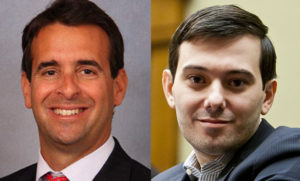Jury Finds Former Martin Shkreli Attorney Guilty in Stock Scheme
Evan Greebel, Martin Shkreli’s former attorney and co-defendant in a case alleging the two took part in a securities fraud scheme, was found guilty Wednesday of two counts related to his role.
 Greebel, a former partner at Katten Muchin Rosenman and Kaye Scholer, was stone faced as U.S. District Judge Kiyo Matsumoto of the Eastern District of New York read aloud guilty verdicts for one count each of conspiracy to commit wire fraud and conspiracy to commit securities fraud.
Greebel, a former partner at Katten Muchin Rosenman and Kaye Scholer, was stone faced as U.S. District Judge Kiyo Matsumoto of the Eastern District of New York read aloud guilty verdicts for one count each of conspiracy to commit wire fraud and conspiracy to commit securities fraud.Members of Greebel’s legal team, which mounted a defense that included a roughly nine-hour summation that spanned two days, appeared shocked by the verdict as Greebel’s wife wept in the courtroom.
Acting U.S. Attorney Bridget Rohde appeared in the courtroom for the verdict.
The jury handed up the verdict after it briefly held deliberations on Friday afternoon and again Tuesday. No date is set for sentencing, but Greebel faces a maximum of 20 years in prison.
The verdict comes several months after another federal jury in Brooklyn found Shkreli, a former pharmaceutical executive who rose to fame after he increased the price of a drug for people diagnosed with HIV and AIDS from $13.50 a pill to $750 a pill, guilty of three of eight counts related to the scheme. Shkreli was convicted of two counts of securities fraud and one count of conspiracy to commit securities fraud in August.
Greebel was accused of working with Shkreli, the former CEO of Retrophin, in what prosecutors called an elaborate Ponzi scheme. Shkreli was convicted of using Retrophin’s assets to pay back investors in two hedge funds he created—the now-defunct MSMB Capital Management and MSMB Healthcare Management—through the use of sham settlements and consulting agreements.
Greebel, 44, who worked as outside counsel to Retrophin from 2012 to 2014, was accused of drafting the phony documents as well as fraudulently backdating agreements.
Shkreli’s sentencing is scheduled for Feb. 21. He spent more than a month as a free man following his conviction but, in September, Matsumoto revoked his bail after he posted a $5,000 bounty for a lock of Hillary Clinton’s hair on his Facebook page.
Greebel’s trial did not attract the level of publicity that surrounded Shkreli’s six-week trial, owing presumably to the fact that Shkreli has maintained a public persona as something of a millennial villain while Greebel has maintained a relatively low profile. Shkreli did play a key role in Greebel’s proceedings.
Greebel’s attorneys worked to downplay his association with Shkreli, saying the government was trying to find their client “guilty by representation,” and painted Greebel as a victim of Shkreli, rather than an accomplice.
But Assistant U.S. Attorney Alixandra Smith, who also appeared for the government during Shkreli’s trial, argued Greebel saw Shkreli as a “meal ticket,” and that he made $900,000 working with Shkreli and Retrophin—triple what Katten was paying him at the time.
In a statement, Rohde said Greebel “exploited his knowledge of the law in his efforts to break the law” and that he “betrayed the trust” of Retrophin board members to represent the company’s best interests.
In addition to Smith, Assistant U.S. Attorneys David Pitluck and David Kessler also appeared for the government.
Unlike the jury in Shkreli’s trial, jurors in Greebel’s case felt there was enough evidence presented to find the attorney guilty of conspiracy to commit wire fraud. Shkreli was acquitted of his single count of wire fraud conspiracy, which Benjamin Brafman, lead counsel on Shkreli’s defense team, called the “heart” of the government’s case against his client.
Speaking with reporters after the verdict Wednesday, Reed Brodsky, a partner at Gibson, Dunn & Crutcher, said that, with regard to his client’s past relationship with Shkreli, it is difficult to “get justice when there is an association with someone this toxic.”
“This is a case where we believe and hope that the judge will evaluate the evidence and the law and right this injustice,” Brodsky said.
Greebel’s defense team also included Gibson Dunn partner Randy Mastro and Joshua Dubin, a Florida-based solo attorney.

